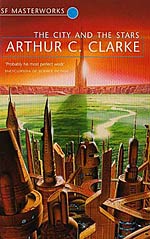
![]() davidpackwood1@gmail
davidpackwood1@gmail
7/6/2024
![]()
Clarke's career can be divided into two main periods: the 50s and 60s when he was producing short stories like "The Sentinel", - which was turned into "2001"- and novels like "Childhood's End" and the 70s starting with "Rendevous with Rama," hard SF which he did more effectively in popular science books. "TCATS" belongs to the first period. Set in the far future when Earth's geography has completely changed, it deals with the fortunes of two remaining civilisations: Diaspar and Lys. Diaspar is a sheltered city completly controlled by an AI that gives individuals from memory banks physical bodies, which are constantly re-cycled within the Hall of Creation. By contrast, Lys is a society on the outside, situated in the countryside, a totally democratic culture guided by telepathy. But unlike Diaspar, Lys divorced itself from machines, and favours a predominantly agrarian society, the opposite to the synthetic society of Diaspar. Into Diaspar is born the protagonist, Alvin, who is not re-cycled, but is a first-born; these individuals are known as "uniques" and they were programmed into the system so that Diaspar might achieve conceptual breakthrough, and discover its true origins and destiny. Helped by another diverger, Khedron- the Jester- Alvin finds a subway system that takes him to Lys where he meets Hilvar who becomes his best friend. Eventually, the two of them use a spaceship and a renegade robot to journey into space in search of Diaspar's origins. The big reveal is that mankind did not penetrate space, become afraid of it and humbly retreated to Diaspar. Humans never went into space but created a mental intelligence which rebelled against them; they therefore created a counter- intelligence to combat the evil first mentality. When Alvin and Hilvar bring Vanamond- the second force- back to Earth, the whole false history propagated by the makers of Diaspar is revealed. "TCATS" is a perfect blend of SF and fantasy since Lys comes across as a kind of Elfland, and the high science within Diaspar seems almost magical. Clark famously formulated the law that "any advanced technological society would seem indistingusable from magic." This early, much admired novel is one of the best examples of that idea.